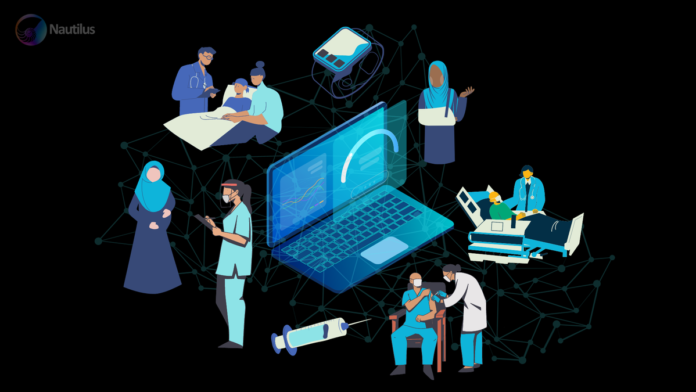Nautilus Consulting is a Business Reporter clientThe earliest known medical records are palaeolithic cave drawings of rudimentary surgical procedures dating back 4,500 years. But it was not until the 19th century that patient-specific notes began to be kept. For the next 100 years, ever-increasing mountains of paper tracked every investigation, observation, diagnosis and intervention.In the mid-20th century the first healthcare information systems emerged, principally to manage appointments, beds and the many administrative aspects of hospital care, while clinicians stuck with pen, paper and often illegible handwriting. By the 1960s, the first clinical computer systems were emerging, and over the next 60 years their adoption has grown. In parallel, coding systems have emerged and developed so that data recorded is more precise and consistent than the quirks of natural language.Today, we have reached a point where electronic patient record (EPR) systems are in widespread use. The most recent government initiatives for the NHS in England are focussed on levelling up the digital maturity of care providers, by providing investment support to achieve a level of maturity which would significantly reduce the reliance on paper record keeping, and supporting sharing records across care settings within regions. Just this month, the incorporation of NHS Digital into NHS England has been accelerated, embodying the drive to put data, digital and tech at the heart of NHS transformation.Business Reporter: How data can drive true efficiency in modern healthcareFor perhaps the first time in history, disparities in data standards and technology no longer stand in the way of making data available to support real-time operational decision-making, research and service developments.A gnarly picture of ‘critical incident’ declarations, ever-growing waiting times in emergency departments and workforce availability is contributing to the pressures facing healthcare services across the country. Healthcare leaders are faced with the near impossible task of delivering more with less year on year. The role of data in addressing these concerns is recognised in government policy (‘Data Saves Lives’, June 2022), which aims at further improving data availability and access.However, data availability has not yet translated fully into data use. While there are substantial aspirations to build ‘data lakes’ and use ‘big data’ analytics to support population health management, actual examples are still few and far between, and practical benefits even fewer. Very often these initiatives are driven from technical and data specialists adopting the ‘Field of Dreams’ model – build it and they will come – rather than a clinically or operationally led approach to tackle known specific problems. Hence, the impact on clinical pathways remains limited.Crucially, we need to plan models of care which support behavioural health and focus on preventive interventions that improve health and reduce demand on acute services.Use of physical fitness monitoring devices is touted as one way to improve population health. But the sheer volume of data can be overwhelming, and the self-selecting cohort that currently use these devices tends to be fitter and healthier than average. However, use of remote monitoring for patients with chronic conditions can enable much more patient-led care, and provide earlier warning of deterioration while keeping patients at home. But this also brings the challenge of ensuring symptoms are not missed and care is personalised. Not every trial will prove beneficial, but the advent of data availability makes them possible and worth pursuing.Similarly, digital twins are being proposed to deliver a step-change in management capability. First introduced in manufacturing 20 years ago, a digital twin combines capturing numerous data points with process modelling to provide real-time insight into operational delivery. However, healthcare is an order of magnitude more complex. Every patient is unique, and the impact of emergency admissions and the critical dependency on a highly-skilled specialist workforce all make understanding the consequences of process variations more challenging, but also more worthwhile. This can be tackled by simplifying the model, tackling a single clinical pathway, or applying more sophisticated mathematical techniques drawn from probability theory. Both approaches are likely to become evident in the coming years.At the other end of the scale, clinical trials continue to gather and use much smaller cohorts of data to test specific treatments, using protocols that have been developed and tuned over the past 100 years. Only very few studies, most notably the recent Covid RECOVERY trial, have brought together the discipline of the clinical trial with large cohorts of data. The trial has so far included more than 48,182 participants internationally. This is showing the way for the future but is still very much the exception not the rule.Access to large, longitudinal datasets supports real-world research. The ability to analyse the records of millions of patients, understand the impact of demographic factors and measure outcomes of different treatment regimens can deliver new insights far beyond the capability of individual clinical trials. The ZOE Covid study (the world’s largest ongoing study of Covid-19, with more than 4.5 million contributors globally) showed how mass population sourced data could yield valuable clinical results. The opportunity to combine patient reported outcomes with clinical records, at scale, will deliver a true measure of the impact of therapies on patient experience.We need to find innovative ways use available data to fundamentally redesign models of care and drive operational efficiency. The challenge now is for healthcare leaders to set the agenda on how data will be used to the advantage of patients and their clinicians.Nautilus Consulting is a leading digital healthcare consultancy with specialist data streaming technologies in use across operational, clinical and research functions in the NHS.For more information please visit www.nautilus-consulting.co.uk .Originally published on Business Reporter


